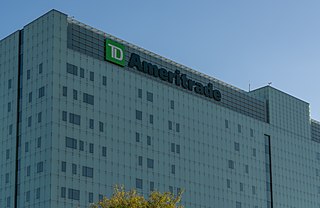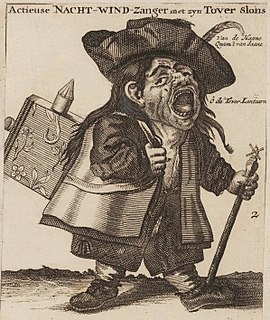Related Research Articles

A stock exchange, securities exchange, or bourse is an exchange where stockbrokers and traders can buy and sell securities, such as shares of stock, bonds, and other financial instruments. Stock exchanges may also provide facilities for the issue and redemption of such securities and instruments and capital events including the payment of income and dividends. Securities traded on a stock exchange include stock issued by listed companies, unit trusts, derivatives, pooled investment products and bonds. Stock exchanges often function as "continuous auction" markets with buyers and sellers consummating transactions via open outcry at a central location such as the floor of the exchange or by using an electronic trading platform.

Wall Street is an eight-block-long street in the Financial District of Lower Manhattan in New York City. It runs between Broadway in the west to South Street and the East River in the east. The term "Wall Street" has become a metonym for the financial markets of the United States as a whole, the American financial services industry, New York–based financial interests, or the Financial District itself.

A stock market, equity market, or share market is the aggregation of buyers and sellers of stocks, which represent ownership claims on businesses; these may include securities listed on a public stock exchange, as well as stock that is only traded privately, such as shares of private companies which are sold to investors through equity crowdfunding platforms. Investment in the stock market is most often done via stockbrokerages and electronic trading platforms. Investment is usually made with an investment strategy in mind.
To invest is to allocate money in the expectation of some benefit in the future.

In finance, being short in an asset means investing in such a way that the investor will profit if the value of the asset falls. This is the opposite of a more conventional "long" position, where the investor will profit if the value of the asset rises.

The Wall Street Crash of 1929, also known as the Great Crash, was a major American stock market crash that occurred in the fall of 1929. It started in September and ended late in October, when share prices on the New York Stock Exchange collapsed.

Peter Lynch is an American investor, mutual fund manager, and philanthropist. As the manager of the Magellan Fund at Fidelity Investments between 1977 and 1990, Lynch averaged a 29.2% annual return, consistently more than double the S&P 500 stock market index and making it the best-performing mutual fund in the world. During his 13-year tenure, assets under management increased from US$18 million to $14 billion.

E-Trade Financial Corporation, a subsidiary of Morgan Stanley, offers an electronic trading platform to trade financial assets including common stocks, preferred stocks, futures contracts, exchange-traded funds, options, mutual funds, and fixed income investments. It also provides services for employee stock ownership plans, student loan benefit administration, advisor services, margin lending, online banking, and cash management services.

Primerica, Inc. is a United States-based multi-level marketing company that sells insurance and financial services. The company's headquarters are located in Duluth, Georgia.

A stock trader or equity trader or share trader is a person or company involved in trading equity securities. Stock traders may be an agent, hedger, arbitrageur, speculator, or stockbroker. Such equity trading in large publicly traded companies may be through a stock exchange. Stock shares in smaller public companies may be bought and sold in over-the-counter (OTC) markets.
Securities fraud, also known as stock fraud and investment fraud, is a deceptive practice in the stock or commodities markets that induces investors to make purchase or sale decisions on the basis of false information, frequently resulting in losses, in violation of securities laws.
Wade Bruce Cook is an American author and self-proclaimed financial guru. Cook claims to have started his success when he was a taxi driver in the 1970s. His first book, Real Estate Money Machine, was originally self-published in 1981. He filed for personal bankruptcy in 1987. An updated version of his book was published in 1996. His company was liquidated in 2003 after it had been forced into Chapter 11 bankruptcy by creditors, and he served 88 months in prison for tax evasion. He still offers trading advice through his website and publications.

TD Ameritrade is a broker that offers an electronic trading platform for the trade of financial assets including common stocks, preferred stocks, futures contracts, exchange-traded funds, forex, options, cryptocurrency, mutual funds, fixed income investments, margin lending, and cash management services. The company is a subsidiary of Charles Schwab Corporation and its services and accounts will be integrated with those of Schwab by 2023.

Microcap stock fraud is a form of securities fraud involving stocks of "microcap" companies, generally defined in the United States as those with a market capitalization of under $250 million. Its prevalence has been estimated to run into the billions of dollars a year. Many microcap stocks are penny stocks, which the SEC defines as a security that trades at less than $5 per share, is not listed on a national exchange, and fails to meet other specific criteria.
Cortes Wesley Randell is an American businessman. Randell worked on the Ballistic Missile Early Warning System. He also founded the National Student Marketing Corporation, and was president of Federal News Service.
Louis G. Navellier is Chairman and Founder of Navellier & Associates in Reno, Nevada, which manages approximately $2.5 billion in assets. Navellier also writes four investment newsletters focused on growth investing: Emerging Growth, Blue Chip Growth, Quantum Growth and Global Growth, and can frequently be seen giving his market outlook and analysis on Bloomberg, Fox News, and CNBC.

Shearson was the name of a series of investment banking and retail brokerage firms from 1902 until 1994, named for Edward Shearson and the firm he founded, Shearson Hammill & Co. Among Shearson's most notable incarnations were Shearson / American Express, Shearson Lehman / American Express, Shearson Lehman Brothers, Shearson Lehman Hutton and finally Smith Barney Shearson.
Harry M. Markopolos is an American former securities industry executive and a forensic accounting and financial fraud investigator.

The Madoff investment scandal was a major case of stock and securities fraud discovered in late 2008. In December of that year, Bernie Madoff, the former NASDAQ chairman and founder of the Wall Street firm Bernard L. Madoff Investment Securities LLC, admitted that the wealth management arm of his business was an elaborate multi-billion-dollar Ponzi scheme.
Merrill, legally Merrill Lynch, Pierce, Fenner & Smith Incorporated and previously branded as Merrill Lynch, is an American investing and wealth management division of Bank of America. Along with BofA Securities, the investment banking arm, both firms engage in prime brokerage and broker-dealer activities. The firm is headquartered in New York City, and once occupied the entire 34 stories of 250 Vesey Street, part of the Brookfield Place complex in Manhattan. Merrill employs over 14,000 financial advisors and manages $2.3 trillion in client assets. The company also operates Merrill Edge, an electronic trading platform.